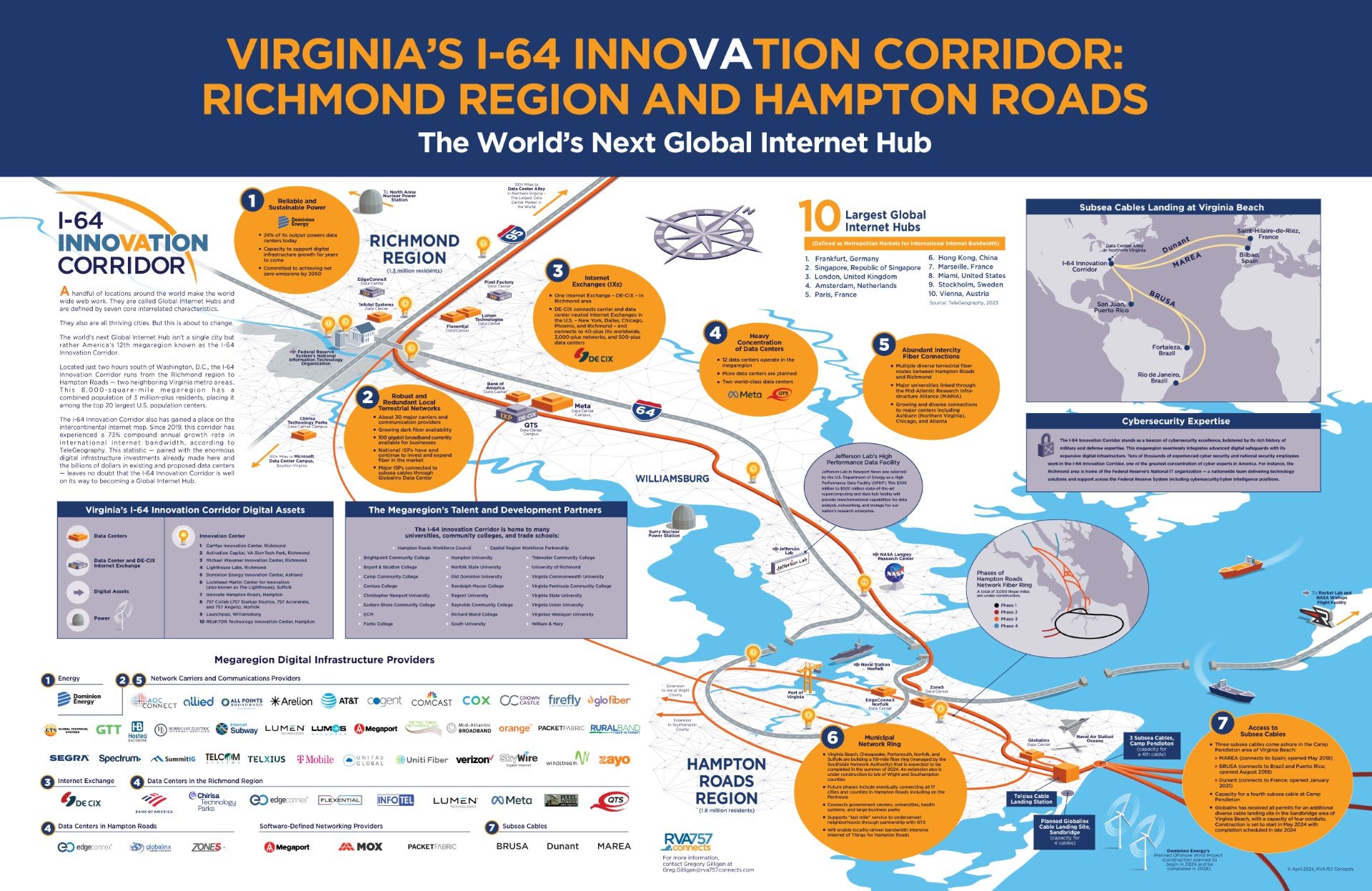
Becoming the World’s Next
Global Internet Hub

Digital Infrastructure & Data Center
Information Hub
A Resource Center on Data Centers and Beyond
The world’s next Global Internet Hub isn’t a city,
but a megaregion:
The Richmond region and Hampton Roads
The world’s next Global Internet Hub isn’t a single city but rather an area from the Richmond region to Hampton Roads. Known as the I-64 Innovation Corridor, located just two hours south of Washington, D.C., this 8,000 square mile megaregion has a combined population of more than 3 million residents, placing it among the top 20 largest U.S. regions. (Click on the map to enlarge.)
The Strategic Plan: The what, the why and the how
The key to the I-64 Innovation Corridor becoming a Global Internet Hub is combining the digital assets of both the Richmond region and Hampton Roads.
Global Internet Hubs have seven core interrelated components that define their world-class digital infrastructure. The Richmond region and Hampton Roads together have all seven of these components and more.
Accelerating the buildout of the digital infrastructure in the I-64 Innovation Corridor will ensure that the high-paying jobs of the future and the industries of tomorrow will be here.
Virginia, and specifically the megaregion, needs to have those kinds of jobs to grow the state’s economy. The Richmond and Hampton Roads markets are behind in growing their IT/tech talent workforce when compared to the national average and to their peer markets. (Click on the image to enlarge.)
The Global Internet Hub Steering Committee identified 10 strategies in order to make the I-64 Innovation Corridor one of the world’s recognized Global Internet Hubs.
This bold plan – a once-in-a-generation opportunity – will be transformative for the megaregion.
Why are Global Internet Hubs Important?
Global Internet Hubs around the world attract a growing level of business interest and investment.
Hubs play a crucial role in optimizing network routes and fostering a robust and interconnected digital ecosystem.
Hubs enhance the speed, reliability, and overall performance of the internet. Bringing together multiple networks, hubs reduce the distance that data must travel between different regions, minimizing latency and improving the overall speed and reliability of internet connections.
Global Internet Hubs enable even broader access to a range of online services, promote inclusion, and facilitate economic development.
From an economic development perspective, Global Internet Hubs are important because businesses choose to co-locate and interconnect in the most robust and growing digital infrastructure hub markets.
This, in turn, attracts more tech and tech-adjacent talent, fueling a success cycle that positions these regions as a vital part of the world’s digital backbone.
The I-64 Innovation Corridor – an 8,000-square-mile megaregion that runs from Richmond to Hampton Roads – is well on its way to becoming a Global Internet Hub.
This initiative will accelerate the I-64 Innovation Corridor’s ascendency to Global Internet Hub status.
Watch a presentation that RVA757 Connects made before the Ashland Town Council about digital infrastructure including data centers.
John W. Martin spoke in March 2024 before the Ashland Town Council about digital infrastructure.
What are Global Internet Hubs?
Global Internet Hubs play a vital role in enabling the flow of information and communication across the internet, serving as the backbone of the digital economy and underpinning virtually every aspect of modern society.
A Global Internet Hub is a physical infrastructure that facilitates the exchange of internet traffic between multiple networks, telecommunication carriers, internet service providers (ISPs), content delivery networks (CDNs), social networks, cloud services, and other interconnected entities.
Hubs serve as major points of convergence, facilitating the exchange of data between different networks and enabling global connectivity.
Some key characteristics and components of Global Internet Hubs include::
physical infrastructure (typically large data centers equipped with high-capacity networking equipment);
network interconnection points through direct peering agreements or through internet exchange points (IXPs);
content distribution allowing providers to distribute content closer to end-users and improve performance;
Internet Exchange Points (IXPs) that provide neutral meeting points where multiple networks can exchange traffic; and
subsea cables that provide the primary means of international connectivity with high-speed, low-latency communication between different continents.
Virginia Secretary of Transportation, W. Sheppard Miller III, talks about the importance of the I-64 Innovation Corrdior because of the subsea cables landing in Virginia Beach





